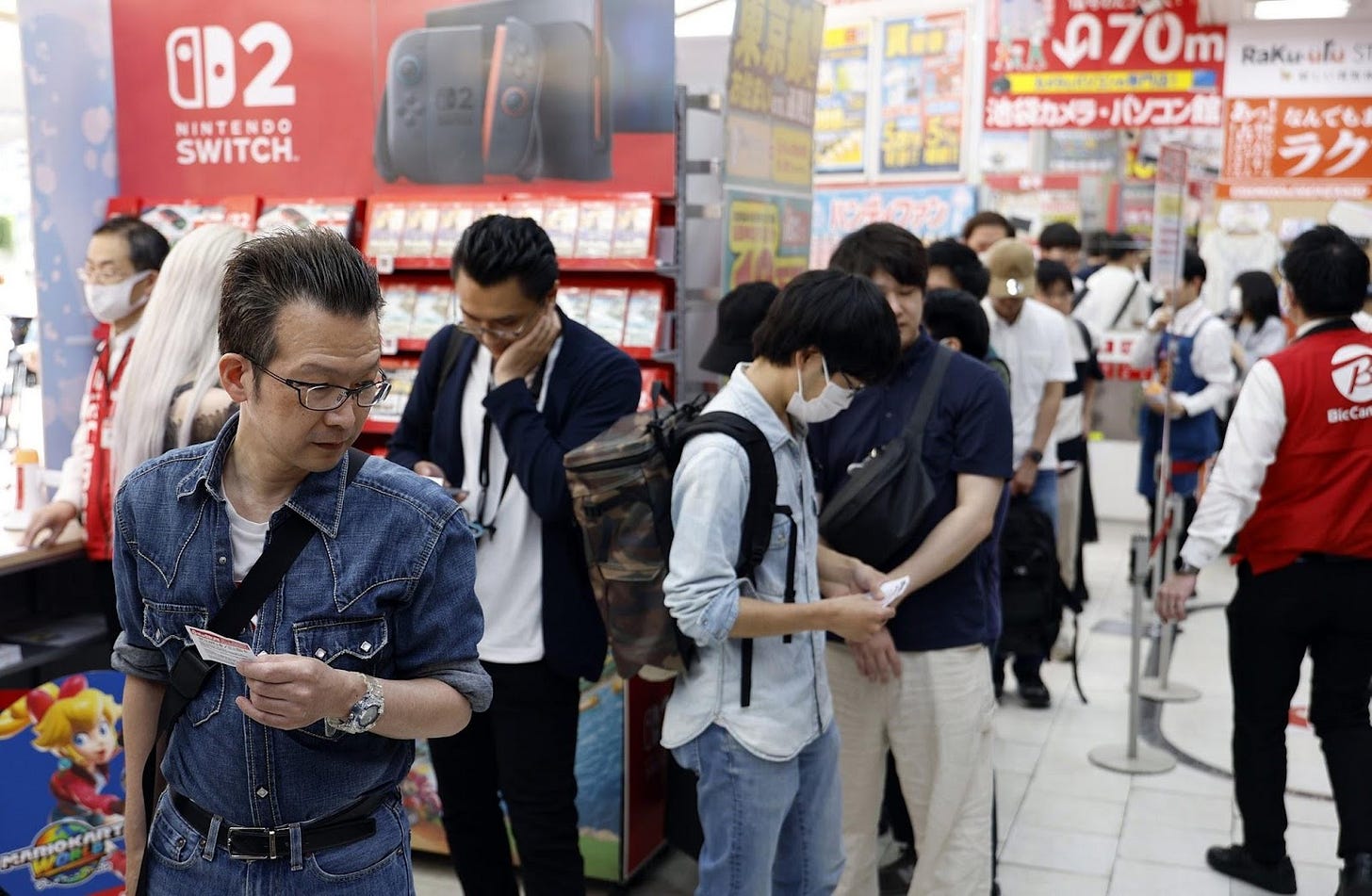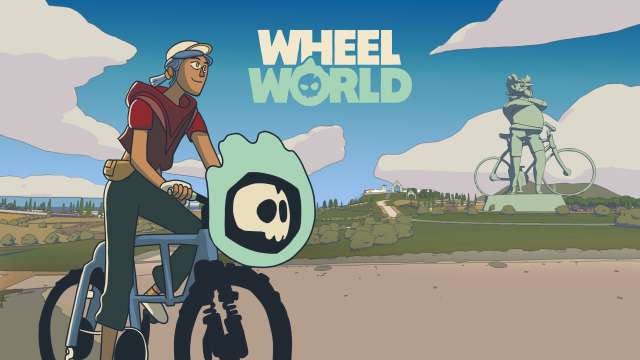This week’s Video Games Industry Memo is sponsored by:
The gamescom embargo countdown has begun! With PXN, your assets are secure, scheduled, and ready to launch the second you say go.
Take control of your next big moment. Request a demo today: pxn.world
-
I crack the Case of the Ever-multiplying Gaming Showcase
-
VGIM reveals some intriguing data on the state of the Japanese market
-
This week’s hottest video games are brought to you by short kings and lycra weirdos
| Find me on Linkedin | Follow me on Bluesky |Check out my website | Email me |
Hello VGIM-ers
Tom here, returning once again to give your inbox a brief George-based reprieve.
As Mr Osborn taps away at his masterpiece and George 2 delves deeper into her PlayStation Vita, I’m sliding back into your inbox exactly where I left off: sweaty and dazed.
While you might start to wonder if I have some kind of medical condition, I have, in fact, just returned from a 35-degree, 90% humidity Japan. I find myself both sad to be back on UK soil and grateful to no longer be leaking sun cream.
As I mourn the loss of 7/11s and feel shame over my frankly obscene number of nerdy purchases, I conclude that it’s incredibly easy for us to overly idolise Japan.
For gamers, Japan is the Mecca for video game fans. It’s the land that gave us Nintendo, PlayStation, SEGA, Capcom and Square Enix. A place where businessmen unwind in dwindling arcades, where streets look impossibly clean and second-hand games are treated like pristine artefacts – not grubby, chocolate-coated CEX nightmares.
Yet as my mystery work in Tokyo concluded, my wide-eyed adoration gave way to an altogether bleaker realisation.
My visit coincided with Japan’s upper house election, whose results revealed a country facing all too familiar problems. While Japan is often viewed as a uniquely insular nation, with the Yen plummeting and its economy failing to recover post-COVID, it’s joined the global trend of swinging to the populist right.
Forming in 2020 and making a name spreading YouTube-based conspiracies, Japan’s Sanseito party shocked many by gaining a surge of support in last week’s vote, running on an anti-foreigner ticket. Despite less than 3% of the populace being foreigners, Sanseito went from holding a single parliamentary seat to commanding an alarmingly healthy rump of 14 of them.
Like everywhere else then, Japan isn’t immune to the murky tide of fear and misinformation. Still, Tokyo’s subway does have Pikmin adverts on its trains – and even the bleakest political news will never take that from us.
Now, though, as jetlag fades and I leave Tom Weebgan in Tokyo, I thought it pertinent to ask another (hopefully less depressing) question…
First world problems: Each year, it becomes harder to keep track of the number of games revealed during the season of summer showcases. In fact, I’m exhausted just thinking about them. Whenever Keighley’s mouth opens, a small army of games inevitably emerges – a barrage of announcements firing out of him like a human, trailer-spewing machine gun.
That’s a lotta games: It’s easy to imagine that losing track of most of them is just a result of ageing, becoming jaded or simply having a shit memory. But thankfully for me, the numbers suggest a larger, less thirties-specific problem. At this year’s Summer Games Fest, over 7070 games were revealed across 35 different showcases. 7070! Let that sink in for just a moment, if you will.
E3’s Hundred: While it’s an undeniably cool number, it’s an absurd amount of games to be announced in a week-long period. Back in E3’s glory days (rest in peace, big man), Microsoft, Sony, Nintendo and Ubisoft would pack out L.A. theatres for their conferences before ushering the press into a Convention centre to play around 100 games. In E3’s final year (2021), just shy of 200 new titles were revealed.
GCSE in Statistics for the win: Somehow, in just four years, the number of game announcements has increased 35-fold. And even though the number of players has risen from 2.96 billion to 3.3 billion over the same period, an 11% increase in the audience was never likely to be enough to swallow this gargantuan glut of content.
Money motivates: So, what’s behind the whopping rise of all these video game showcases peddling thousands of games to baffled players? “I think it’s twofold,” says Dom Peppiatt, Eurogamer’s Deputy Editorial Director of News and Features, “First, there’s the money. I’ve seen some figures surrounding how much it costs to book 30 seconds at Summer Games Fest, and it’s simply eye-watering. Secondly, by orchestrating your own showcase and programming, you have the chance to talk directly to potential customers and be in direct control of the messaging. Why would Microsoft, for example, want to drop hundreds of thousands of dollars to show a trailer with no context when it could curate the experience better in its own stream?”
A lingering symptom: But a bad case of the video game showcases is also likely to be a side effect of the COVID pandemic. “Much of this was driven from lockdown when events went from in-person to digital and audiences flocked to them,” reflects Jake Tucker, Editorial Director of the PC Gaming Show, “Even now, with physical events back on the table, livestreams remain a major focus, especially for developers and commercial partners, because they consistently drive strong performance in terms of viewership and wishlist additions.”
Feeding the beast: For the organiser of this year’s inaugural Galaxies showcase, however, the rapid rise in livestreams is simply the result of a prolific art form needing to sell itself. “I think it’s a natural reflex of the gaming ecosystem filling a need,” says Chris Thomas, Creator of the Galaxies showcase, “There are so many games released from so many teams, from so many different backgrounds, sizes and experience levels. So it makes sense to me that the number of showcases would expand more or less in-step with the number of games being released.”
Overstocked and overserved: What was once a tightly-curated E3 spectacle, however, now feels closer to watching someone rapidly stack supermarket shelves. The problem is, these shelves are now stocked too swiftly for most consumers to even notice half of the tantalising goodies adorning them. Where it was once feasible to stand out in a batch of 200 games, it seems almost impossible to make an impression in a wave of 7000. Maybe – just maybe – E3 was the perfectly proportioned meal deal of video games.
A message from our sponsors PXN: For all showcases big and small, our secure PXN platform ensures your assets reach the right audience, at the right time.
No chaos. No leaks. Just a flawless global reveal.
Take control of your next big moment. Request a demo today:pxn.world
How livestream good?? With an avalanche of livestreams competing for viewers’ attention, the pressure for each showcase to entertain is now higher than ever. That means building something special to get bums on seats in a virtual world. “It’s really just about bringing something for everyone,” says Tucker,“ I’d never built a video game showcase until two years ago, but the most important thing is different textures. If it was a show made to my tastes, it would be nothing but tactical shooters and turn-based strategy, but when you’re trying to make a show watched on launch weekend by over 17 million people, you have to try and pick a wide selection of games. I feel like I’ve done a good job when every single viewer comes away with a cool new game they want to wishlist.”
Gotta go fast: Rhythm matters too. “You can have huge announcements but the show might not be well received because of poor pacing or bloat,” says Thomas, “Conversely, you can have lesser-known or smaller games and still have a successful showcase because the cadence and the wrapper accommodates them. With Galaxies, we try to be very mindful of the audience. So we are very intentional about curating interesting games, keeping things highly textured with a lot of variety and making sure we never outstay our welcome. Sixty minutes, soup to nuts.”
Open world marketing: While E3 was hugely focused on the Western market, the influx of new trailers may simply be a reflection of the games industry becoming increasingly global. “Summer Games Fest can promise ‘x’ amount of viewers, but other publishers are starting to break away from the glut of games in order to let their stuff breathe more,” says Pepiatt, “ That’s why you get so many games at SGF that US and European audiences may not have heard of, but make a lot of money in other markets: those publishers are starting to use shows like this as a wedge.”
Spready to rumble: Just as game releases used to be crammed into the holiday window, Tucker believes that the answer is simply to spread out showcases throughout the year like trailer-filled buttercream on the cake that is our industry. “Showcases and events that can bring good content and production values to the table will always find an audience,” he says, “but I would expect to see events moving to anchor themselves around other, less well-served periods in the calendar.”
Galaxy brain: Psst, don’t let any other event organisers hear you Jak– “We very deliberately schedule Galaxies as far away from the other existing big umbrella moments as we can,” agrees Thomas, apparently physically linked to Mr Tucker, “We are creating our own platform in otherwise quieter windows to give developers and publishers an alternative moment to stand out and also give gamers new dates in the diary to get excited about. I’d rather we create our own noise than get lost in someone else’s.”
Swap passivity for interactivity: Peppiatt believes that an increase in downloadable playable demos could well be the way to combat trailer fatigue. “I actually think something like Steam Next Fest – where devs and publishers can actually distribute hard assets directly to their audience – will become more popular,” says Peppiatt, “SNF does incredible numbers, and from a media standpoint our coverage of that often equals (sometimes beats!) events put on during the showcase-pocalypse.”
The new (marketing) beat: Thomas, however, believes that even with Steam Next Fest, developers and publishers simply need more avenues to help get the word out about their games. “There is a huge demand for mechanisms that surface high-quality games to players,” reflects Thomas, “On average, 350 games hit Steam every week. It is a firehose, and so the amount of noise vs signal when you’re trying to get attention on a game is very high. There is a bigger need than ever for game discovery, and successful showcase streams give publishers a ready-made audience and a clear moment to build a marketing beat around.”
The show(case) must go on: Yet for more established events, their conferences are less fuelled by a desire to fill a marketing need, but to serve an already-devoted audience. “If audiences want to see game reveals – and our data shows that they do – there’s a place for showcases,” says Tucker, “In-person events were marred more by Covid and the fairly significant costs involved, and virtual showcases don’t have those problems. The important thing is to keep gamers at the heart of everything we do, because each event has to prove time and again why it’s worth someone taking time out of their day to watch the stream.”
The Publisher has our best interests at heart, though, right?? Having a greater number of showcases is a clear win for developers and publishers- but is it a win for the consumer? “Generally speaking, no,” says Peppiatt, “I like that we get uber-specific showcases, but I think that with publishers hosting their own presentations, there is an opportunity for these brands to be more ‘on message’. A lot of in-person, hands-on opportunities in the media have been replaced with catch-all showcases, and that gives journalists less space to ask questions, debate the PR line, and interrogate the quality of what they’re seeing. Something has to give, but I think we’re in for a few more years of diminishing returns before we get there.”
Final words: And the only way showcase organisers are going to avoid that fate will be to make sure they offer something special for someone. “The challenge now is figuring out which showcases deliver something special and to which audiences,” reflects Thomas, “ it’s possible that too many showcases crop up – in which case, it’ll be up to gamers to decide which ones are worth their time.” Wise words indeed.
Nice and Japan-easy: Briefly reviving Tom Weebgan, I come bearing some Japanese industry news. Despite comprising just 2.2% of the global player base, Japanese players generate 9.1% of global games revenue, according to the latest Newzoo report that we’ve had an early sneaky look at. The same data shows that Nintendo leads console hardware sales in Japan, with the Kyoto-based company commanding 70% market share. You can read more on Newzoo’s website when it lands formally at 9am UK time via the link above.
Porn and order: The International Game Developers Association (IGDA) has hit out against the recent delisting of a range of NSFW games from Itch.io, after payment providers decided to whack out the thumbscrews in response to an Australian conservative pressure group. The IGDA has labelled the move ”alarming”, stating that the delisting has “disproportionately harmed developers producing legal, consensual, and ethically-developed content, including creators from marginalised communities,” while also labelling its opposition to content that “fetishises sexual violence, non-consensual sexual acts, or the sexualization of minors.”
Lightning strike: Atari has agreed to acquire Swedish gaming holding company Thunderful for around €4.5 million, purchasing 82% of the company’s shares. Thunderful has published titles like the SteamWorld series, Lost in Random, Viewfinder and The Gunk. They’re also undergoing a restructuring at the moment, so a real swing and roundabouts week for the staff.
Fight, fight, fight (again): Sony has filed a lawsuit against Tencent, alleging that the publisher’s game Light Of Mortriam is a clone of the Horizon series. I think that the two do look incredibly similar, but hey, that’s just my Tencents (Editor’s note: you’re fired).
Leaky does it: A reliable online leaker has allegedly revealed the prices of Xbox’s two new handhelds, with the beefier model reportedly setting players back more than a PS5 Pro. The Xbox Ally is apparently going to cost €599, while the Ally X is supposedly coming in at a hefty €899. Both models will reportedly be playable at gamescom ahead of an October release.
Sam Bandah has joined Bandai Namco as their new Communications Manager…Mel Ramsey joins BBC Newsbeat as Gaming Reporter…Ali Habib is the new Gaming Lead at Unicef UK…Chris Buckley was promoted to Head of Partner Acquisition at Hub and Spoke Games…And for Government watchers, Amy Joseph has been promoted to Deputy Head of Campaigns, Strategic Communications and External Affairs – Marketing Lead at the UK’s Department of Culture, Media and Sport…
Larian Studios are hiring for multiple positions worldwide…Rock Paper Shotgun is hiring for a new London-based Editorial Director…EA wants a Recruitment Coordinator in Bogota, Colombia…And Warner Bros is on the lookout for an Executive Producer for a TBA title in Montreal…
-
Siggraph, Vancouver – 10th-14th August
-
Gamescom, Cologne – 20- 24th August
-
Games Industry Law Summit, Vilnius – 2nd-4th September
-
XDS, Vancouver – 2nd-5th September
-
Tokyo Games Show, Tokyo September 25-28th
-
Wheel World offers up a uniquely lycra-clad adventure, letting players pedal their way across a charming open world in a cycling epic that’s part Bike Of The Wild, part Olli-Olli World. Reviews suggest that it’s a wheely good time.
-
Grounded 2 carries on the pint-sized theme, letting sickos everywhere tame, ride and murder giant ants.
-
Tales of The Shire launches this week, the game that at long last allows players to live out the ultimate power fantasy – pottering around a small village.
Before you go…
The UK government’s new Online Safety Act has come into effect (properly this time), requiring people to use age verification to access everything from social media sites to adult platforms if there’s a risk of accessing saucy material.
A virtual Norman Reedus helping teens access porn? Not even Kojima could have predicted that one…





